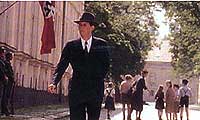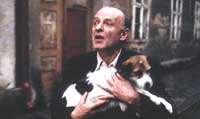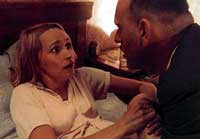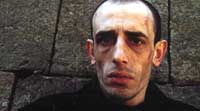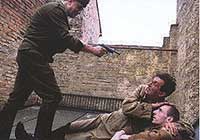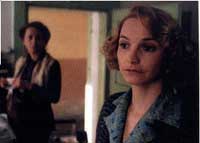|
Evan Williams
(The Weekend Australian, December 15-16, 2001)
DIVIDED
We Fall is that troubling paradox: an enjoyable film about the Holocaust.
Or, to put it another way, Jan Hrebejk has made a thoroughly absorbing
film about the Holocaust, with moments of bleak humour. I have no qualms
about it. Those who considered Life is Beautiful or Schindler's
List unworthy of their subject - because they trivialised the horrors
of Nazism - were missing the point. Steven Spielberg was affirming the
necessary principle that no subject, however appalling, is beyond the
province of the artist. Roberto Benigni was making an even more difficult
point: that in dealing with the worst human tragedy there are times when
humour may be the only adequate response.
Both were
great films in their ways. But, even so, I'd be happier if the leading
studios - in Hollywood especially - steered clear of the subject for a
while. Even the best-intentioned forays into this dire territory - Alan
J. Pakula's Sophie's Choice - have a way of looking pompous and
meretricious. And no critical assessent is likely to please everyone.
When Pauline Kael wrote her famously critical review of Shoah,
Claude Lanzmann's epic Holocaust documentary, in 1985, many Jewish readers
cancelled their New Yorker subscriptions. Perhaps it's a field best left
to the east Europeans. As the chief victims of the final solution, they
should be allowed to make of it what they will - and treat it as a joke
if they want to. In this matter, surely, they're entitled to the last
laugh.
Not that
Hrebejk's film is exactly a comedy. If I had to give it a one-word label,
I'd call it a thriller. But it has a fine sardonic bitterness, an amused
indignation, a subdued drollery. There's a nice moment when a Nazi collaborator
- the film is set in a small town in German-occupied Czechoslovakia during
the last years of the war - is coaching a friend in the best expression
to assume in the company of SS officers. "You must practise that irreproachable,
loyal look," he advises, adopting the kind of open- mouthed half-smile
full of vacuous adulation that a rock fan might wear in the presence of
an idol. The precise degree of half-heartedness with which a Nazi salute
may he safely given is also the subject of some scrutiny. Even the most
abject collaborators had their pride.
Our hero
is an amiable loafer, Josef Cizek (Boleslav Polivka), who lives with his
wife Marie (Anna Siskova). The couple is childless and the point may be
taken that even in starving, war-ravaged Europe, childless marriages were
considered a misfortune (if only because larger families were more likely
to be accepted as refugees). But Josef and Marie's rather humdrum life
is about to change. Behind the wardrobe in their apartment is a hidden
room where Josef, on a desperate impulse, agrees to conceal a fugitive
from a Nazi death camp, a young man called David (Csongor Kassai). The
chances of a Jew escaping from a concentration camp in Poland and making
his way home to rural Czechoslovakia were so remote in 1943 that the film
seems a little fanciful from the beginning but Hrebejk (with a screenplay
by Petr Jarchovsky) builds a compelling mood of suspense.
Keeping David
concealed is a task made more perilous by unexpected visits from Horst
(Jaroslav Dusek), a former colleague of Josef, now a. Nazi functionary,
who likes to drop in unannounced. Horst has designs on Marie, whom he
tries to seduce while Josef is at a clinic having his sperm tested. The
perilous balance of hilarity and dread is all the more effective for the
film's understated tone. Hrebejk has made one of the best films of the
year. If some moments have an air of unreality - Marie, in one scene,
conceals David in her bed while Horst makes a drunken call - we are never
in any doubt about the horrors of the world outside. And most of the performances
seem flawless. Polivka gives us, in Josef, a gullible and foolish man
with unexpected reserves of steel; and as the fickle Marie, Siskova is
splendid as well. I thought David looked a little too much like the undead
hero of Nosferatu, despite Kassal's air of elusive, haunted dignity. But
it's Dusek, as Horst, who catches the venality and wretchedness of the
time with a brilliant study of a compromised soul. The moral complexity
of the characters gives the film a rare intensity. "You wouldn't believe,"
says Josef, "what abnormal times can do to normal people."
Watching
Divided We Fall, perhaps we can.
|
